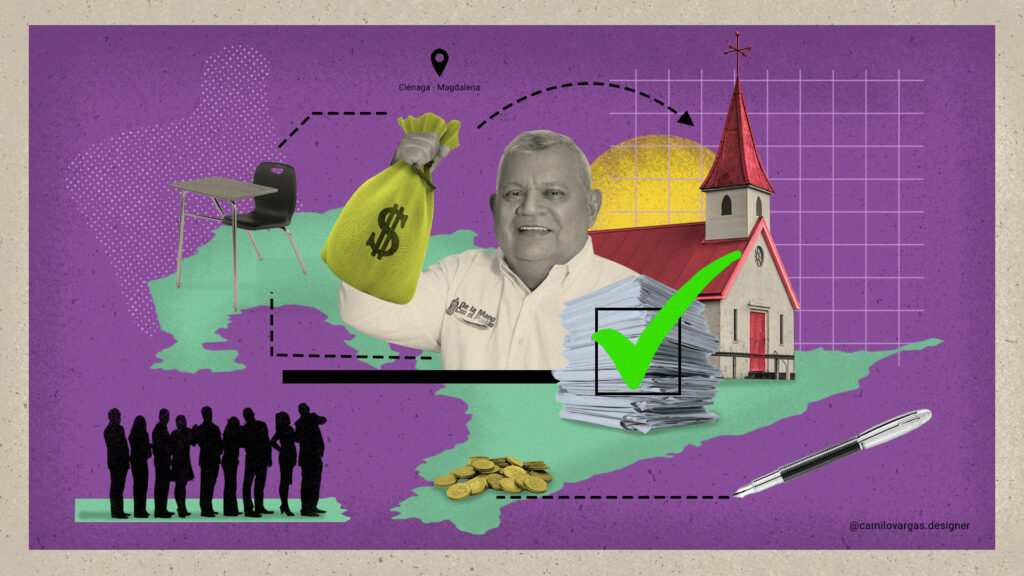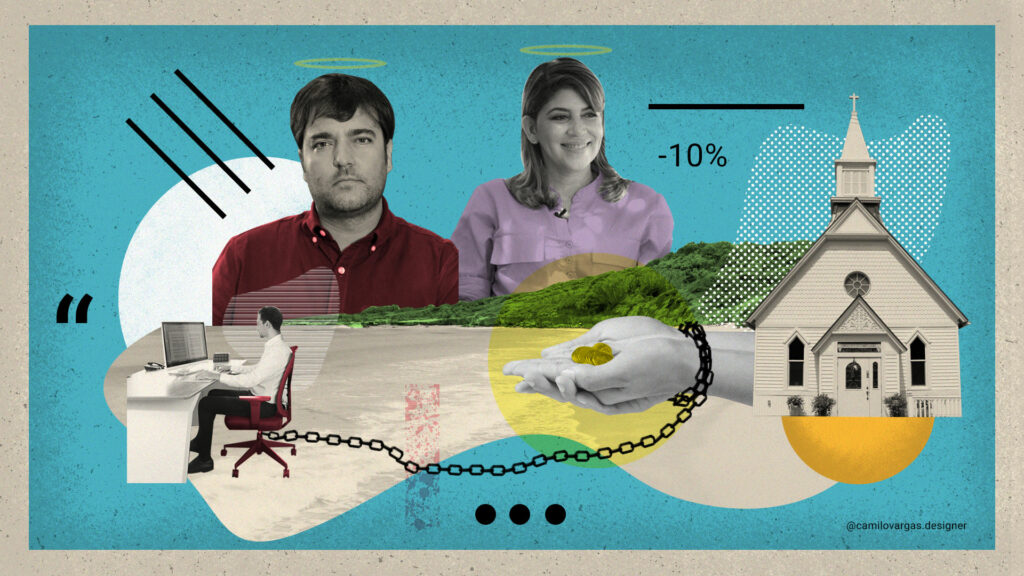The relationship between churches and public spending in Colombia is as close as it is turbid

The League Against Silence, Colombia
Translated by Edward Duigenan
The relationship between churches and public spending in Colombia is as close as it is turbid. Official institutions sign multimillion contracts with foundations that are exempt from fiscal control and are not under obligation to show how these funds are administered. Public monetary resources in the hands of religious organizations are difficult to trace, and that hinders verifying any irregular handling of these funds. Churches in our country are privileged with special legal status bestowed by the Ministry of the Interior that frees them from legal requirements normally established for profitable organizations.
The church can also implement State projects without resorting to calls for bids from the state or be fiscally accountable. Additionally, the judicial system impedes those legal actions that could generate sanctions. For this reason, in the majority of cases, when irregularities occur, the only results are public disapproval, ethical verdict and indignation.
The Liga Contra el Silencio (The League Against Silence) found out about a recent case. In September 2020 there was a public scandal for the contract of 1,650 million pesos between the administration of Luis Tete Samper, mayor of Ciénaga, Magdalena, and the Christian evangelical church Nueva Jerusalem Apocalipsis 21.2. The objective according to the contract was to “promote and implement strategies for pedagogical development in the municipality”. Those close to Fuerza Ciudadana (Citizen Strength is English), opposing political party to the mayor´s De la Mano con el Pueblo (In Hand with the Town) movement, denounced that contracting “personal interests” were at stake. According to the allegation, the legal representative of the church is the pastoress and journalist Yurissa del Castillo Romero, whose husband, Victor Polo Rodriguez, Pastor of the same church, is director of Caracol Radio in Santa Marta. The revelation in local media described it as a form of buying positive information in Caracol Radio for Samper’s administration. The details about this contract, signed on 5 March 2020, should have been subsequently uploaded three days later to Servicio Electrónico de Contratación Pública (Secop), the digital platform for State purchases. But it was only formalized on 6 August of the same year. The appointed of this church, protected by law, was made by direct contract. This way the Christian congregation won the right to administer 1.650 million pesos (US$472,000 approx.) in pedagogical functions without participating in any open calling by part of the government, where its experience and aptitude for carrying out the project would have been evaluated. In the Secop platform, it is the only contract signed to appear related to an evangelical church in recent years. Its legal representative appears as a public contractor on numerous occasions but only in relation to her profession.
The Education workers Union of Magdalena (El Sindicato de Trabajadores de la Educación del Magdalena) didn’t find motives for objecting to this contract. “It doesn’t matter what we think about these contracts. If we denounce without evidence, these actions get thrown back and affect the denouncers. Go through with a legal pursuit in this area of religious institutions and public entities is a fight between a tiger and a tied up mule” says César Cantillo Peralta, president of the union.
Cantillo recognizes that teachers are contracted by churches to carry out the same work they would otherwise do as civil servants. But in this case, as it is said, they don’t enjoy the benefits of a stable position, their professional experience not being taken into account when defining salary, they are paid late, don’t have the right to unionize and live in fear of losing their only source of income if they report the situation.
“In rural areas of Sierra Nevada, where those programs arrive imparted by churches, due to the absence of the State, teachers and parents see God in person. Even though it is unfair to the teacher and it is impossible to audit public financing, it is better than nothing”, says the unionist.
According to Cantillo a form of government exists that enables indemonstrable corruption
“One can moan about party interests, paying for favors, over-costing, patronage, but it is legal and one cannot act”, he adds.
César Cantillo Peralta, president of Sindicato de Trabajadores de la Educación of Magdalena.
The contract between the mayor’s office of Cienaga and La Nueva Jerusalem reads:
“Contracts signed with churches and religious confessions are subject to that established in article 200 of Law 115 1994, for this reason, certified public entities will select the respective contractor directly… and without necessity that the contractor be authorized in the bidder bank of those entities- which is the list of non-official educational establishments with trajectory and aptitude to give educational services-, or to attend a bidding process.

LAST YEAR THE ADMINISTRATION OF LUIS TETE SAMPER, MAYOR OF CIENAGA, MAGDALENA, HANDED OVER A CONTRACT FOR 1.650 MILLION PESOS TO THE CHRISTIAN EVANGELICAL CHURCH NUEVA JERUSALEM APOCALIPSIS 21.2.
In his first period as mayor (2012-2015), Tete Samper signed contracts with another church, Centro Bíblico Internacional Emanuel: one for 1.419 million (US$ 400,000 approx.) and an additional one for 709.5 million (US$ 200,000 approx.) for “administrative services for public educational services”.
The League contacted Karen Villafaña, educational secretary for the mayor’s office of Cienaga, in order to know the details to how the contract was allocated, but to date there has been no response.
Another contract for 2.091 million pesos (US$ 586,000 approx.), also in Ciénaga, was signed in 2016 between Edgardo Pérez Díaz, the then mayor, and the church Centro Cristiano Avivamiento AD para las Naciones, that was represented legally by the entrepreneur Luis Fernando Carillo, investigated by the State attorney, at the time, for crimes against public administration, in this case for a similar contract with the same local authority for” environmental activities”.
The objective of all contracts being almost identical: “educational services through the promotion and implementation strategies of pedagogical development in State educational institutions in the rural zone” of Ciénaga. To these contracts there is an additional one, signed in 2016 for 6,574 million (US$1,845,000), with the Governor’s office of Magdalena, likewise for “educational services”.
Rules for injustice doers
“Nonprofit organizations have been the most benefitted in recent years for their growing participation in State contracting. Between January 2014 and July 2016 14.5 billion pesos (US$4.8 million) have been destined to such entities (…), the majority for health and educational processes.
“These entities have two advantages over profit organizations: they are covered by a special legal framework, and, on the other hand, they benefit from fiscal exemptions, which make it difficult to control the expenditure of public financial resources”
“A real risk exists because of the eligibility of these foundations, corporations and/or associations in the execution of the objectives of these contracts” says Nicolás Ardila, a specialist lawyer in administrative law. He believes that the concept of the AGR is still a current phenomenon as the legal framework hasn’t changed. He also explains that these contracts should adhere to various steps: “In the pre-contracting stage there is the obligation to show that the contractor has the capability of complying with the necessary infrastructure, equipment, capital and that also has the experience and profile that the project requires. But this does not apply to non-profit organizations under the special legal framework”, said the lawyer. Ardila explains that the most appetizing factor for these organizations is the arrangement by direct contracting, where tender is not specified. This way many steps to avoid corruption, which hinder favoring contractors with personal interests, are encumbered. This process is faster and allows resources to be implemented in the short term.
All contracts with the State should be published in Secop within three working days after being signed, but many religious entities sign their contracts through foundations, which makes it much more difficult to detect. Ardila says that these religious organizations get their legal status without difficulty because the law is ambiguous and permissive.
“Citizens’ initiatives to watch over public spending are futile as civil servants are not breaking any known law” he explains.
Nicolás Ardila, Lawyer specialist in administrative law
In respect to fiscal responsibilities, Law 20 of 1974 approved the Concordat between the Colombian State and the Vatican, and from then on the Catholic church has been considered exempt from tax-paying. It was therefore established that church properties were also excused, including properties designated for services, diocesan “curias”, bishop’s’ and priest’s’ dwellings and seminaries. With the Constitution of 1991, when Colombia became a secular State, the exemptions were extended to other religious entities recognized in the Ministry of the Interior’s book Reconocimiento jurídico de las entidades religiosas en el derecho colombiano (Legal recognition of religious entities in Colombian Law). The academic, Vicente Prieto, explains that, according to the Statuary Law on Religious Freedom, The Ministry of the Interior is that which recognizes the legal status of churches, faiths and denominations; their federations, confederations and associations of ministers that can be required through the Public Register of Religious entities.
Nonetheless, The Ministry does not carry out surveillance, control or inspection over them.
“In reality, the exemptions for religious entities to pay taxes belongs to the category ‘Non-profit organization’. Therefore, as a principle, no “special” legal setup is required, but (…) is necessary when wanting to sign contracts with the State”, explains Prieto in his book.
The latest update of the Public Register was on 23 November 2020, When 8,490 religious entities were legalized within special legal status in Colombia.
Nicolás Carrero, fiscal expert, believes churches should make some kind of tax contribution, because “they move a lot of money” and nobody controls them. “They don’t keep receipts. They don’t have an accounting system. They just simply give their word that nobody questions”, he says
Ferney Rodríguez, legal representative of Bogotá Atea, says that while being six years fronting this organization, they have managed to tie up a few loose ends detecting forms of corruption interwoven between public institutions and religious organizations.
“The churches are entrusted with carrying out tasks of animal well-being, health, education and even culture; and through these contracts the quota for naming public servants is met, political favors are paid, political Campaigns are paid for and worshipers are favored”, the activist warns.
Ferney Rodríguez, legal representative of Bogotá Atea (Atheist Bogotá)
A report from Bogotá Atea about secularity in Colombia points out that separation of church and State should guarantee that public money shouldn’t be predestined to sustain or favor religious practice. “But in Colombia cases still crop up where money is destined to chapels, group masses and evangelical concerts under the pretext of defending religious freedom hand-in-hand with the systematic pursuit of evangelists and Pentecosts vying for public office”.
The Catholic Slice
On 28 february 2020, the general secretary for the Mayor’s Office of Barranquilla, Carlos Alfredo Acosta, signed a contract with Pia Sociedad Salesiana Inspectoría San Luis Beltrán, for 5.528 million de pesos (US$1.5 million approx.), for the administration, direction and pedagogical orientation in the Don Bosco Social Center. The district handed over infrastructure that the contractor committed to take care of and maintain, as well as equipment to educate 2,950 students. The State assigned 1, 874,000 pesos (US$530)for each pupil, and from that the salaries of the teachers, staff’s social security, maintenance of infrastructure and the wages of workers employed by the religious organization.
Pia Sociedad Salesiana registered in Secop 13 contracts in Barranquilla between 2013 and 2020 (eight with the Mayor’s office and five with Sena: National Training Service) which adds up to 28,375 million pesos (US$8million approx.)
With the foundation Fe y Alegría, the Mayor’s office of Barranquilla registered a contract for 2,985 million pesos (US$836,000) in 2019, and another for 116,4 million pesos (US$32,600 approx) in 2020. With Fundación San Carlos Borromeo for public education and community developement, adding another two contracts giving the total sum of 2,475 million pesos (US$694,000 approx.) in 2019, and 1,994 million (US$560,000 approx.) pesos in 2020, to attend to 1,325 students each year.
All these agreements were made through direct contracts, without paying taxes, with transactions made exempt from VAT and without being subject to audit by State control bodies.
José Ignacio Jiménez, president of the Asociación de Educadores of the District de Barranquilla (Association of educators in the district of Barranquila), speaks of a “dodgy dealings”. He explains that the district receives a donation in infrastructure, it builds it or rents it so that a school can function there and also puts in the equipment, but it doesn’t manage the school, but gives license to a religious entity and pays for this service from state funding.
Foundations, says Jiménez, save money because they hire teachers for definite periods, without recognizing overtime nor guaranteeing stability.
“One can presume that apart from being lucrative for them, it is very convenient for the politicians because they finance their campaigns without anyone checking up on spending”, he says.
“Between the foundations Fe y Alegría and San Carlos Borromeo in Barranquilla there are contracts for about 140 teachers. These religious entities are benefited by huge contracts for doing something that public administration should be doing. It’s the subcontracting of education” says the unionist.
THE MAYORSHIPS OF JAIME PUMAREJO (BARRANQUILLA) AND VIRNA JOHNSON (SANTA MARTA) ALSO REGISTERED HUGE CONTRAcTS WITH RELIGIOUS ENTITIES. | CREDITS: @CAMILOVARGAS.DESIGNER.

On the Secop platform, Fe y Alegría appears, between 2011 and 2020, with other contracts in Barranquilla: 15 with the mayor’s office and 49 with ICBF (Instituto Colombian de Bienestar Familiar- Colombian Institute for the Wellbeing of the Family) . Without counting what is spent in other regions of the country.
For their part, Fundación San Carlos Borromeo, between 2012 and 2020, was allotted 16 contracts, (15 with the mayor’s office and 1 with ICBF).
Ley 1294 de 2009 (A public law), establishes that licenses can be given in concession for educational services when the public entity is not in conditions to do so.
“It’s a weakness in the law the allows for corruption, because the district of Barranquilla is plenty capable of doing so, but prefers the easy way because it leaves dividends for paying for political favors and personal gain”, says Jimenez.
In order to hear the version of the Mayorship of Barranquilla The League contacted a member of the public relations office of the institution, but there was no response.
Replica in Santa Marta
With Fundación San José (catholic), whose legal representative is Alicia Valencia Vives, the Mayorship of Santa Marta signed in February 2020 a contract for
1.800 millon pesos (US$504,000 approx.), for pedagogical work with students of Instituto de Educación Distrital San Francisco Javier, from the vulnerable sectors of Garagoa and Timayuí. En 2019, a similar contract, for 1.596 millon pesos (US$447,000 approx.), was awarded to the same foundation by ex mayor Rafael Martínez, of Fuerza Ciudadana, the same political party as Virna Johnson, the current mayor.
From 2014 until 2020 registers of contracts between the mayorship of Santa Marta and la Fundación San José have been registered in Secop every year. In total, seven contracts that total 8.945 million pesos (US$2.5 million approx.).
Other contracts for rent of properties with the Diocese of Santa Marta, signed between 2019 and 2020, total 430 million pesos ($US120,000 approx.).
The Rabbi Richard Gamboa, Secretary General of Cabildo Interreligioso de Colombia (Colombian Interreligious Canonry), considers that solutions for the protection of public funding are well overdue. He also says there’s a lack of fiscal control and norms that guarantee transparency and State supervision for the compliance of those contracts.
But Gamboa believes it’s necessary to use precise legal jargon and proceed with caution, because a hostile analysis of the situation could lead to the enforcement of discriminatory policies against the churches. The challenge implies finding a middle ground between the excess that the rabbi mentions the lax privileges of today.